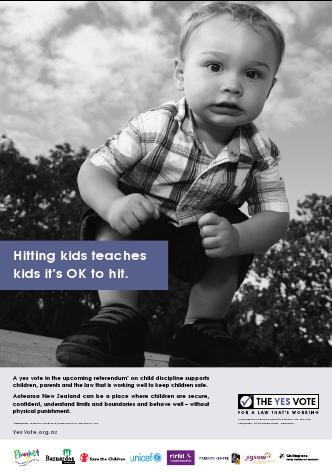June 10, 2009
Media Statement – 10 June 2009
The Yes Vote coalition welcomes Social Welfare Minister Paula Bennett’s statement in the NZ Herald today in support of the child discipline law as it stands.
Ms Bennett’s statement contradicts claims by opponents of the law that she does not support it.
In an interview with the NZ Herald on those claims, Ms Bennett said, “”The Government’s position on this legislation is clear – that should good parents be convicted for a light smack, we would look at changing the law, but so far we have seen no evidence that the law is not working.”
Deborah Morris-Travers of the Yes Vote coalition welcomed that statement, which is consistent with statements by the Prime Minister, John Key.
“As is so often the case, the claims by opponents about the legislation are shown either to be false or grossly distorted.”
Labour leader Phil Goff has also been recently misrepresented on the issue by opponents of the child discipline law reforms of 2007.
In a written response to a Yes Vote coalition supporter on May 25, following those claims, Mr Goff said: “Labour is opposed to reversing the repeal of section 59 of the Crimes Act. We believe that the law is working as intended and has not resulted in criminal sanctions against good parents who do not harm their children.”
“It appears that the political consensus that secured the passage of the law in 2007 remains and this is good for children, families and New Zealand,” concluded Ms Morris-Travers.
June 8, 2009

By now, the so called ’smacking’ debate is one of those issues that has been aired so thoroughly that its arrival back on the political agenda is like having an argumentative uncle turn up for Christmas dinner. He’s here again, there’s going to be a fight – and how long will it be before he goes away again ?
Next month, in the middle of a recession, New Zealand is set to spend something close to $10 million on a citizens initiated referendum (CIR) on the subject. The result will not be binding on the government and – judging by our previous track record on CIR that are NOT held at election time – the turnout can be expected to be low. The 1995 firefighters CIR attracted a turnout of only 28%.
This year’s referendum is being held nearly two years after the legislation that amended S59 of the Crimes Act – thus removing the defence of ‘reasonable force’ in cases involving parental violence against children – was passed by Parliament by a majority of 113 votes to 8. This year, in a classic case of putting the cart before the horse, the country will be holding its postal vote on the CIR before the Ministry of Social Development has finished its review of how the new legislation has been working. That review is not due to be released until September or October.
So far, the Act – and with it, the operational discretion available to Police on whether it is in the public interest to prosecute – appears to be working exactly as the law makers intended. Parents are not being criminalised en masse by the law change, as some had feared. In the one headline case where a Police prosecution was mounted, the jury agreed with the prosecution that the 50 year old parent involved had indeed committed an assault when he flicked his four year old child’s ear, pulled his hair and punched him in the face.
In July though, the public will not be asked to deliver a verdict on the law that was passed in 2007, or on how that the Police have administered it since. The referendum question is :“Should a smack as part of good parental correction be a criminal offence in New Zealand?” With the best will in the world, it is hard to see how any MP – or any citizen – who supported the verdict of Parliament could wholeheartedly answer either “Yes” or “No” to such a formulation, since it begs the question in at least two important respects.
One, It contains a value judgment about the context (“ good parental correction”) and secondly, it assumes the question of whether, under current Police procedures, such a smack can ever be a criminal offence. Essentially, the public is being asked to pass a judgement on a scenario that two years down the track, has not eventuated.
Still, that is the question that has been accepted by the Clerk of the House for the vote, and freedom of speech factors should carry a great deal of weight. After all, this is a procedure initiated by citizens, and official intrusion has to be kept to the absolute minimum. On the other hand, some $10 million of public money is likely to be spent on this process. For that reason alone, the procedures for CIR deserve closer scrutiny.

For answers, I consulted Dr John Parkinson of York University in the United Kingdom. Parkinson, a New Zealander, has written extensively on issues of direct democracy, With good reason in the past, Parkinson has criticised the high hurdle that any citizens initiated referendum in New Zealand has to meet before it can trigger a ballot. The organizers are given only one year ( plus a brief extension in extenuating circumstances) to collect supportive signatures from ten per cent of the voting population.
In this case, that meant Larry Baldock and the other organizers of the ‘anti-smacking’ CIR had to gather about 285,000 signatures – which boils down to a requirement to gather on average, 781 signatures each day, every day, for an entire year. No wonder very few CIR ever manage to make the signature target. When taken together with the high 5% threshold for MMP, it is another reason why politicians should never be trusted to write the checks (or cheques) and balances on how democracy should operate. Compare the New Zealand situation with Switzerland, which gives campaigners 18 months to gather 100,000 signatures – or just 1.75% of registered voters, at a rate of only 182 a day.
On the other hand, Baldock may care to rethink his previously stated enthusiasm for California’s citizens initiated measures. As I pointed out a year ago, the threshold for initiatives in California may be only 5% of voters registered for the previous elections for governor, but these must be gathered in only 150 days, at a rate of 2,492 a day – and while the result is binding, such statutes can be (and regularly are) struck down subsequently by the courts, on constitutional grounds.
First, I asked Parkinson this question : How do other countries manage, if at all, the issue of leading or loaded questions in CIR ? “The New Zealand CIR institution,” Parkinson replied, “ is unique, because there is no draft law being voted on. In those US states which use the device, CIR are not “questions” but complete laws or constitutional amendments. You have to have a legal team to draft a complete Bill, and that’s what gets sent to a vote. In Switzerland, initiatives take the form of constitutional amendments. Thus, Swiss and US voters have a lot more to go on than New Zealand voters do. The latter have just a vague statement of intent which Parliament (which is sovereign, remember, not ‘the people’) has to interpret, consider and respond to.”
Also, Parkinson adds, no one else in the world operates an ‘acceptability’ test for CIR questions. “In the US, any such requirement would breach the First Amendment. Instead, they leave it up to other groups to come up with competing propositions, and put all the competing ones on the same ballot. It’s a ferociously expensive process, which means only the very well-funded have any chance. In Switzerland, they handle it by means of (a) delaying tactics. The Federal Council can choose any time it likes to hold the vote – and (b) government counter-proposals which go to a vote at the same time as the citizen’s initiative. Counter-proposals almost always win. In other words, no-one tries to filter out bad ideas in advance. They trust to the competitive democratic process to reveal the flaws in proposals. Having options [counter-proposals] helps.”

Thirdly, he says, questions are vetted in New Zealand, once they have passed the signature target. The precise question has to be agreed between the Clerk of the House of Representatives and the proposer, so that it meets the requirements of the CIR Act 1993. “ The ‘leading question’ issue has not come up in the three previous CIR that went to a vote,” Parkinson says, “but one, the Withers referendum [on crime, held in 1999] clearly breached the requirements of the Act in that it asked at least four separate questions. Mr Withers was extraordinarily resistant to the Clerk telling him to simplify it, and my interpretation of the correspondence between them is that the Clerk thought there was no point continuing an unpleasant fight when the vote would not make a difference anyway. That is my interpretation, not the Clerk’s. I don’t know what the process was in this case.”
Should loaded questions be ruled out? Well, in defence of the organizers of this year’s referendum, it is certainly not unknown for even government–initiated referendums, much less CIRs, to ask value-loaded questions. John Howard’s Australian republic referendum in 1999 for instance, was not shy about assuming the outcome that it sought, and nor was Augusto Pinochet’s ‘defence of the dignity of Chile’ referendum in 1988. Only those who didn’t care about Chile’s dignity – or who were too gutless to defend it – could disagree with El General, and his modus operandi.
The second question posed to Parkinson was : Given the track record of low turnout in New Zealand on non-binding postal CIR held outside the context of an election, what sort of majority can fairly compel a government to pay heed – and does overseas practice on non-binding referenda give us any guidance?
In other words, if ten per cent of voters seek a CIR, and only 30 % of the public respond, and 80% of those that respond express the same opinion, what weight – if any – should be given to that result by the government ?
There are three camps on the “what weight” question, Parkinson replies. “One, ‘pure majoritarianism’ says that 50%+1 is the only justifiable decision rule, and turnout has nothing to do with it. The second “consensus” camp says that there’s no hard and fast rule, but the higher the winning margin and the higher the turnout, the more legitimate the outcome.
The third is a “super-majority rule” which says you need 50%+1 of total votes, plus a majority in most or all states, or among ethnic groups, or religions, or whatever the major cleavage in society is. The point of super-majorities is to ensure that small states or groups don’t get steamrollered by the big ones all the time.” The examples, he says, include:
– Australian constitutional referendums that require an overall majority of voters, plus a majority in EVERY state;
– Swiss CIR that require an overall majority of the vote, plus a majority in more than half the cantons.

Other examples ? “There are two kinds of turnout restriction,” Parkinson concludes. “In Italy, so called “abrogative referendums”, allow citizens to challenge laws, but they require a turnout of 50%+1.” Otherwise, compulsion can always settle the question of turnout. Australia, Belgium, Brazil, and 27 other countries have compulsory voting, and that effectively settles any legitimacy question about the turnout.
Overall, Parkinson comes down on the side of the obvious. “ My view is that, given the non-binding nature of the vote, a big majority on a low turnout is not as compelling as a big majority on a big turnout. If it’s binding, then I like the double-majority system – it forces people to try to persuade each other rather than just bully each other. The decision rule should still be 50%+1 though. I don’t have a considered view on the turnout requirement, but my gut reaction is to prefer compulsory voting – it becomes a badge of citizenship, and not a burden.”
Plainly, compulsory voting – especially on some lobby group’s pet CIR topic – is not a runner in New Zealand, Perhaps it should be, when a highly organized 10 % of the population can compel the wider public to spend $10 million on a process that Parliament, in its considered wisdom, is then free to ignore.
At the very least, the Key government will be wanting to wait and hear from the MSD review of the current law – and how it is operating – before reaching any decision. Unfortunately, the public will not be able to do likewise
by Gordon Campbell at Werewolf
Republished with permission
June 5, 2009
Chair Dr Hone Kaa of Te Kahui Mana Ririki said today he was shocked and saddened by a new report on child abuse published by the Office of the Children’s Commissioner.
“The report shows that Maori children are more likely than any other group to experience abuse, and makes for some sad reading,” Dr Kaa said in Auckland today.
The report, Death and serious injury from assault: a review of international literature and recent findings, reveals that:
- Between 1991 and 2000 half of the children killed by their parents were Maori. They were killed by mothers and fathers.
- Maori ethnicity increases the likelihood of abuse of boys by six times and girls by three times
“This is one of the first times I have seen a report make a direct connection between being Maori and child abuse. So our boys are six times more likely to be abused than other groups, and girls three times more likely. As a people this is the most critical issue we face. I urge every whanau in the country to become actively involved in the battle against child abuse.”
Te Kahui Mana Ririki is a member of The Yes Vote coalition, which is encouraging New Zealanders to participate in the upcoming referendum on smacking.
“The referendum question is misleading: “Should a smack as part of good parental correction be a criminal offence in New Zealand?” This question links smacking with good parental correction, which it is not. I encourage all Maori to vote ‘yes’ so that the current law, which protects our young ones from physical punishment, is maintained.”
“This new report shows how important this issue is for us as Maori.”
June 3, 2009
The repeal of Section 59 from the Crimes Act in New Zealand has only 20% of New Zealanders opposing it. The often dubbed “anti-smacking law” removed the right for adults to use “reasonable force” to discipline their children.
43% of thosse surveyed by UMR on behalf of the Office of the Children’s Commissioner responded positively to the anti-smacking law, 28% opposed; the rest were neutral. However, when asked the question, “Should children be entitled to the same protection from assault as adults?”, 80% said that they should. Lobby group Family First NZ is dismayed at this figure. National Director Bob McCoskrie said, “This figure should be 100%. But the Children’s Commissioner has simply caused confusion by misrepresenting the effect of the law and the difference between assault and a light smack.”
The Crimes (Substituted Section 59) Amendment Act 2007 is fairly well known by the public, but specifics weren’t as well publicised. Perhaps this is why there has been a citizens’ initiated referendum (well over 200,000 eligible voters signed a petition supporting smacking). Children’s Commissioner Dr Cindy Kiro said, “Many parents are ready to move on and find positive ways of parenting that involve discipline without violence, so there needs to be support for that with information and education.”
In 1993 a survey was conducted around the theme, “is it alright to use physical punishment with children” which resulted in 87% agreeing. In 2008, it was at a recorded 58%.
The referendum is open to all eligible New Zealand voters will be held in August via postal vote.
—
Gabriel Pollard is a Journalism student in Christchurch who writes for Wikinews and blogs at Bird’s Eye News.
June 3, 2009
Once again the public are being subjected to misleading and expensive Family First advertisements in the Sunday papers. Politicians are being lobbied by Family First who are undermining a law that is working well and want to turn the clock back so that parents can assault children within the law.
In 2007 New Zealand’s law changed to give children the same protection under assault law as other citizens in New Zealand. A provision in the 2007 law reminding parents that police have discretion about prosecution in cases of inconsequential assaults means that very few, if any, cases at the lower end of the smacking/hitting spectrum are being prosecuted.
The law change reflects efforts to end the social acceptability of anyone’s right to hit anyone else. Over time, this will lead to better outcomes for children as fewer children will be exposed to violence.
In their most recent attempt to illustrate that “good” parents are being criminalised Family First cited four cases:
In one case investigations were undertaken and no charges laid. In another the parent was charged and then chose to plead guilty. The sentence is not mentioned. In the third the parent was convicted and discharged without penalty.
In two cases the parents concerned were not convicted (and therefore not criminalised). In the second case the parent pleaded guilty himself. And in the other case a discharge without penalty outcome was a compassionate one that sent a message to the parent and society about non-violence, It did not inflict punishment that could cause hardship to the family involved.
Family First seem to be suggesting that Police and CYF should ignore allegations of assault on children. All reports of assault on children should be investigated – there is good evidence that use of physical punishment is a risk factor for child abuse and although not all physical punishment is child abuse. It is appropriate, that if someone is concerned enough to make a report, that the safety of the child or children involved is investigated. Very few, if any cases, of minor assault are leading to prosecution.
Family First need to clearly state their views on what level of assault on children they find acceptable – does it include blows to the head and face for example or striking a child too young too understand how they should be behaving? Do they regard out of control, bad tempered striking out as appropriate parental correction?
We note that Family First are no longer citing the Jimmy Mason “face-punch” case as evidence that the law is not working, as it has in previous ads, and noted in their own press statement that the conviction was “appropriate”.
Family First are clear that they do not approve of child abuse and urge action to address the real causes of child abuse. But belief in parents’ rights to use physical punishment and belief in its legitimacy as part of child discipline are a real contributing factor to the existence of child abuse. Many children are still beaten because of such beliefs. But Family First do not seem to understand that by sanctioning use of physical discipline they are undermining efforts to reduce abuse.
May 31, 2009
Google’s PageRanks were updated last week, and we’ve achieved an astounding PageRank of five after being live for under two months! We’ve never seen that happen to a site quite so quickly before, and we’re pleased to be part of a movement that’s able to generate so much traction so quickly. PageRank is Google’s measure of how important and authoritative a web page is; the higher the pagerank, the higher up the search results lists your site is when people search for topics related to your site.
We’ve served tens of thousands of pages to thousands of visitors.
We’ve also received excellent coverage online in places like Hard News, The Hand Mirror, No Right Turn, The Standard, and Frogblog.
The YES in ’09 Facebook Group has 273 members and is still growing stronger every day.
For a study of how attitude affects outcomes in the Twitterverse, compare a search on @theyesvote to a search on @vote_no to see what people really think.
We are committed to retaining a tone that is positive, constructive and evidence-based. This referendum isn’t about personalities, it’s about the issues. It isn’t about religion, it’s about best practice. It isn’t about sound bites, it’s about the whole complex story. And it isn’t about protecting parents, it’s about protecting children.
But the real contest isn’t in cyberspace, it’s in the real world. It’s great to get the word out and build our online following, but to win the real game we need to convince our friends, families, colleages and contacts that a Yes Vote in the August referendum is the only way to send a clear message to our politicians to protect our children by retaining a Child Discipline Law that is working well.
While we seem to be winning the cyberspace contest for now, we won’t be smug or complacent. We need to be out there taking action, and engaging in conversation with everyone who is willing to listen about why a Yes Vote in this referendum is so important to the future of our country.
So let’s seize the initiative, and get out there and raise awareness with as many people as possible.
Technorati Profile
Tags: anti-smacking referendum ,cyberspace ,facebook ,frogblog ,google ,hard news ,no right turn ,pagerank ,the hand mirror ,the standard ,vote no ,voteno.org.nz















